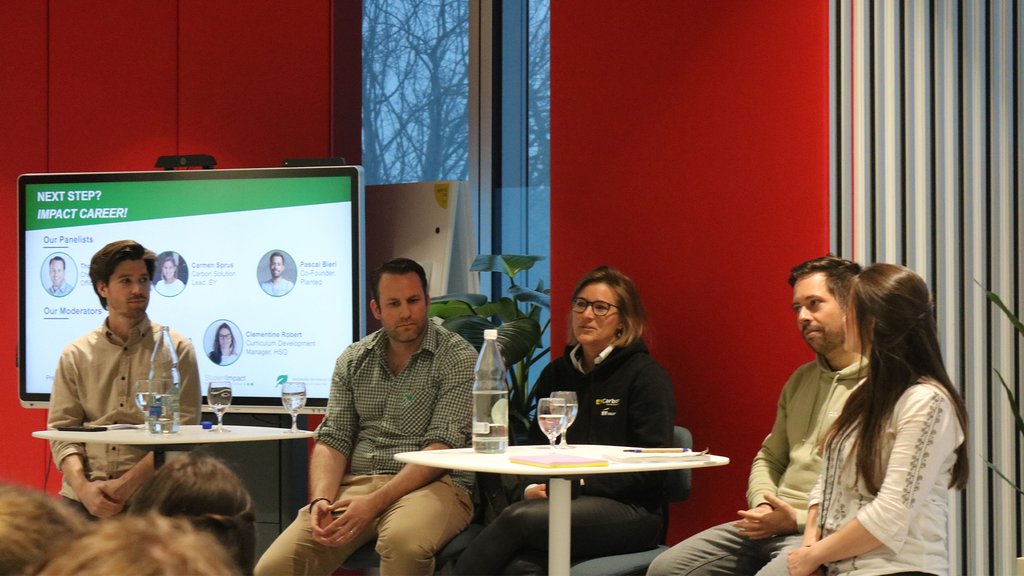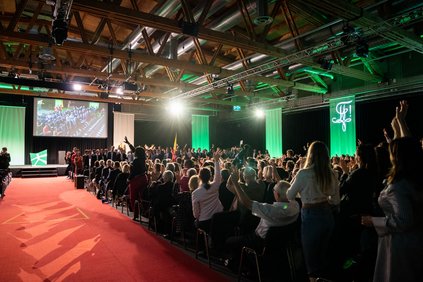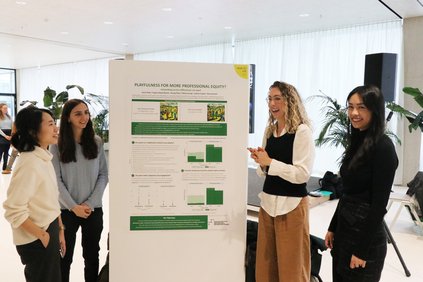Campus - 22.03.2022 - 00:00
Sustainability in professional life: What's next? Impact Career!
As part of HSG Sustainability Week, last Thursday's panel discussion "What's next? Impact Career!" illustrated how HSG alumni contribute to sustainable business practices on the job. By student reporter Sven Schumann.

22 March 2022. Careers in Sustainability are a topic of increasing relevance for many students at the University of St.Gallen. To meet this demand, the HSG community platform for impact-driven student associations ECOnnect co-organized in alliance with oikos, the new ChangeHub, Student Impact and the Sustainable Investment Club a panel discussion to explore impact careers in practice.
Impact on the job?
For many who become interested in the topic of sustainability during their studies and invest some of their free time working for sustainable engagement, the question arises: How can I live out this interest or even this passion in my professional life? Since there are still relatively few opportunities in this area, there are still a few answers to such questions. Insight into this topic was provided by the panel discussion, which was attended by Carmen Sprus, Pascal Bieri and Thomas Zimmermann, three professionals who have all found their way into a career where they can create a lasting impact after completing their studies at the HSG.
After the introduction of the speakers and a brief warm-up session, the 60 or so attendees were treated to an educational, inspiring and highly entertaining discussion about the panelists' occupations, their definition of "impact" and some career advice. The lively round was concluded with an aperitif, where visitors had the opportunity to engage directly with the panelists.
Sustainable entrepreneurship
An attractive way to create sustainable impact is to found a start-up. These are predestined to quickly change the status quo with their agility and creativity. Thus, two of the three panelists had also taken the path after a classic career start in this direction. Thomas Zimmermann, Chief Purchasing Officer and Co-Owner at Farmy, an online retailer of local agricultural products direct from the producer, greatly appreciates the opportunity to change society's thinking and habits. For example, he said, many people are only now beginning to realize what is behind their food. This was also confirmed by Pascal Bieri. After spending time in the USA, he recognized the potential and urgency for the new market of meat substitutes. However, with many competing products, these still have a list of ingredients that need to be questioned for sustainability and health reasons. With this motivation, he and a small team founded the start-up "Planted" at ETH three years ago to sell meat substitute products made from natural, plant-based proteins. He likes how directly the impact can be made visible: "We can directly see how many animals we saved and how much CO2 emissions we prevented.
Established companies also live sustainability
But sustainable commitment is not only possible as an entrepreneur in a young start-up. Speaker Carmen Sprus, Project Lead at EYCarbon, demonstrated this to the audience. In an established, large company like EY, you sometimes have to initiate the change in thinking yourself: "At EY, I recognized that I missed the sustainability aspects, so I tried to get my hands on all the small sustainability projects that were taking place there. But you have to take initiative! However, for such a change in thinking to take place in a company, the right corporate culture is also necessary.
Career planning and application process
The three participating speakers agreed on one point: a passion for the topic of sustainability is essential if one wants to get started in their professional field. However, there was a very fruitful discussion about the right career path. While Thomas Zimmermann likes to see a central theme in the resume of applicants, this was not a prerequisite for Carmen Sprus. When you are young, you should definitely try things out and find out what you like. It is only at a later stage in your career that it is important to slowly become aware of the direction in which you are drawn. For Pascal Bieri, it is particularly important that his candidates bring critical thinking with them. An extreme passion that does not allow for contradictions and ambiguities is also not conducive, he said. He caused a laugh at the end with his advice: "Embrace change and be open to new opportunities! Try to find stableness elsewhere in your life." It's life advice that hits the nail on the head with the fundamental change our planet needs in terms of resource use. Whether in a young start-up or a big player, professional life definitely offers a variety of opportunities to create an ecological impact.
Sven Schumann is studying International Affairs in his sixth semester at the University of St.Gallen.
Image: ECOnnect
More articles from the same category
This could also be of interest to you
Discover our special topics
















